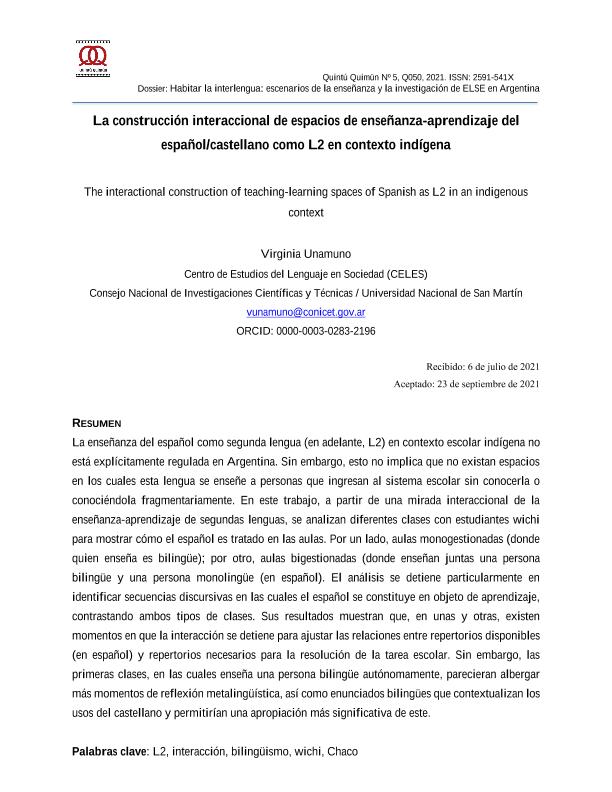Mostrar el registro sencillo del ítem
dc.contributor.author
Unamuno, Virginia

dc.date.available
2022-10-14T12:46:05Z
dc.date.issued
2021-12
dc.identifier.citation
Unamuno, Virginia; La construcción interaccional de espacios de enseñanza-aprendizaje del español/castellano como L2 en contexto indígena; Universidad Nacional del Comahue. Facultad de Lenguas; Quintú Quimün; 5; 12-2021; 1-26
dc.identifier.issn
2591-541X
dc.identifier.uri
http://hdl.handle.net/11336/173182
dc.description.abstract
La enseñanza del español como segunda lengua (en adelante, L2) en contexto escolar indígena noestá explícitamente regulada en Argentina. Sin embargo, esto no implica que no existan espaciosen los cuales esta lengua se enseñe a personas que ingresan al sistema escolar sin conocerla oconociéndola fragmentariamente. En este trabajo, a partir de una mirada interaccional de laenseñanza-aprendizaje de segundas lenguas, se analizan diferentes clases con estudiantes wichipara mostrar cómo el español es tratado en las aulas. Por un lado, aulas monogestionadas (dondequien enseña es bilingüe); por otro, aulas bigestionadas (donde enseñan juntas una personabilingüe y una persona monolingüe (en español). El análisis se detiene particularmente enidentificar secuencias discursivas en las cuales el español se constituye en objeto de aprendizaje,contrastando ambos tipos de clases. Sus resultados muestran que, en unas y otras, existenmomentos en que la interacción se detiene para ajustar las relaciones entre repertorios disponibles(en español) y repertorios necesarios para la resolución de la tarea escolar. Sin embargo, lasprimeras clases, en las cuales enseña una persona bilingüe autónomamente, parecieran albergarmás momentos de reflexión metalingüística, así como enunciados bilingües que contextualizan losusos del castellano y permitirían una apropiación más significativa de este.
dc.description.abstract
The teaching of Spanish as an L2 in schools in indigenous contexts is not explicitly regulated in Argentina. However, this does not imply that there are no spaces where Spanish is learnt by people who have partial or no knowledge of it. In this paper, based on an interactional approach to second language teaching and learning, we analyze lessons with Wichi students in order to show how Spanish is treated in their classrooms. To this end, two cases are explored: (i) those in which the teacher is bilingual, and (ii) those in which the lesson is delivered by both a bilingual teacher and a monolingual Spanish-speaking teacher. Concretely, the analysis focuses on identifying discursive sequences in which Spanish constitutes the object of learning, contrasting both types of classrooms. The results show that, in both dynamics/cases, there are moments in which the interaction stops to adjust the relations between available repertoires (in Spanish) and those necessary for the resolution of the school task. Nevertheless, in the lessons taught by autonomous bilingual teachers, there seem to be more instances of metalinguistic reflection and bilingual speech that contextualize the use of Spanish and allow for a more meaningful appropriation of it.
dc.format
application/pdf
dc.language.iso
spa
dc.publisher
Universidad Nacional del Comahue. Facultad de Lenguas
dc.rights
info:eu-repo/semantics/openAccess
dc.rights.uri
https://creativecommons.org/licenses/by-nc-sa/2.5/ar/
dc.subject
INTERACCIóN
dc.subject
BILINGÜISMO
dc.subject
WICHI
dc.subject
CHACO
dc.subject.classification
Lingüística

dc.subject.classification
Lengua y Literatura

dc.subject.classification
HUMANIDADES

dc.title
La construcción interaccional de espacios de enseñanza-aprendizaje del español/castellano como L2 en contexto indígena
dc.title
The interactional construction of teaching-learning spaces of Spanish as L2 in an indigenous context
dc.type
info:eu-repo/semantics/article
dc.type
info:ar-repo/semantics/artículo
dc.type
info:eu-repo/semantics/publishedVersion
dc.date.updated
2022-09-21T10:35:58Z
dc.journal.number
5
dc.journal.pagination
1-26
dc.journal.pais
Argentina

dc.description.fil
Fil: Unamuno, Virginia. Universidad Nacional de San Martin. Escuela de Humanidades. Centro de Estudios del Lenguaje En Sociedad.; Argentina. Universidad Nacional de San Martín. Escuela de Humanidades. Laboratorio de Investigación en Ciencias Humanas - Consejo Nacional de Investigaciones Científicas y Técnicas. Oficina de Coordinación Administrativa Parque Centenario. Laboratorio de Investigación en Ciencias Humanas; Argentina
dc.journal.title
Quintú Quimün
dc.relation.alternativeid
info:eu-repo/semantics/altIdentifier/url/http://revele.uncoma.edu.ar/htdoc/revele/index.php/lingustica/article/view/3193/60399
Archivos asociados
